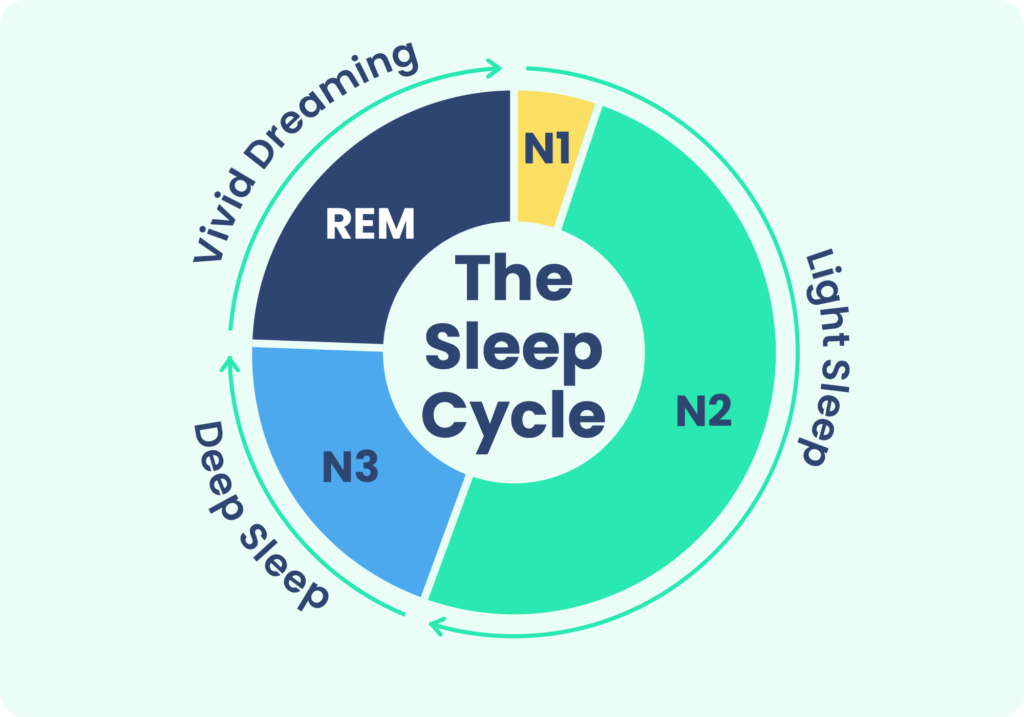
Do you lie awake at night with racing thoughts, or wake up feeling exhausted despite spending 8 hours in bed? You’re among the 1 in 3 UK adults who struggle with sleep problems, according to the Sleep Council’s research. Let us go through 8 proven strategies so you can sleep better tonight.
Poor sleep isn’t just about feeling tired—it affects every aspect of your health, relationships, and performance. Understanding what’s keeping you awake and implementing evidence-based sleep strategies can transform your nights and days.
Why Sleep Problems Are So Common
The Modern Sleep Crisis
Our brains evolved for a world without electric lights, smartphones, and 24/7 connectivity. Modern life disrupts our natural sleep-wake cycle (circadian rhythm) in multiple ways:
- Blue light exposure from screens suppresses melatonin production
- Chronic stress keeps cortisol levels elevated at bedtime
- Irregular schedules confuse our internal body clock
- Caffeine consumption can affect sleep up to 8 hours later
- Racing thoughts about tomorrow’s responsibilities prevent mental wind-down
The Sleep-Stress Cycle
Double-check your settings before publishing.
1 Life Hypnotherapy1lifehypnotherapy.co.uk
Visibility:Public
Publish:Immediately

Poor sleep creates a vicious cycle: lack of rest increases stress hormones, which make it harder to fall asleep, leading to more stress about not sleeping. Breaking this cycle requires addressing both the physical and mental aspects of sleep.
Understanding Your Sleep Challenges
Types of Sleep Problems
Sleep Onset Insomnia (Difficulty Falling Asleep)
- Mind racing with thoughts or worries
- Physical restlessness or tension
- Anxiety about not being able to sleep
- Environmental factors (noise, light, temperature)
Sleep Maintenance Insomnia (Frequent Waking)
- Waking at 2-4 AM unable to return to sleep
- Light sleep with frequent disturbances
- Early morning awakening (before 5 AM)
- Feeling unrefreshed despite adequate time in bed
Stress-Related Sleep Disruption
- Sleep problems coinciding with life stressors
- Sunday night insomnia (anticipatory anxiety)
- Perfectionist tendencies affecting wind-down
- Work or relationship stress carried into bedtime
8 Evidence-Based Sleep Improvement Strategies
- Perfect Your Sleep Environment
Temperature Control
Research shows the optimal bedroom temperature is 16-19°C (60-67°F). Your body naturally cools before sleep, and a cool environment supports this process.
Light Management
- Use blackout curtains or eye masks
- Install blue light filters on devices 2 hours before bed
- Consider a sunrise alarm clock for natural morning awakening
- Keep the bedroom as dark as possible during sleep hours
Sound Optimization
- Address noise sources or use a white noise machine
- Consider earplugs if partner snoring is an issue
- Keep phones in another room or use airplane mode
- Create a quiet sanctuary free from sudden sounds
- Implement the Digital Sunset Rule
The 3-2-1 Rule:
- 3 hours before bed: No more large meals or alcohol
- 2 hours before bed: No more work or stressful activities
- 1 hour before bed: No more screens or electronic devices
Alternative evening activities:
- Reading physical books
- Gentle stretching or restorative yoga
- Journaling or gratitude practice
- Listening to calming music or podcasts
- Taking a warm bath with magnesium salts
- Master the Art of Cognitive Wind-Down
Brain Dump Technique
30 minutes before intended sleep, write down:
- Tomorrow’s priorities and tasks
- Any worries or concerns on your mind
- Anything you need to remember
- Three things you’re grateful for from today
Progressive Relaxation Script
Starting from your toes, consciously relax each body part:
- Tense the muscle group for 5 seconds
- Release and notice the contrast
- Move systematically up your body
- End with deep, slow breathing
- Regulate Your Circadian Rhythm
Morning Light Exposure
Get 10-15 minutes of natural sunlight within 2 hours of waking. This helps set your internal clock and improves evening melatonin production.
Consistent Sleep Schedule
Go to bed and wake up at the same time every day, including weekends. This strengthens your natural sleep-wake cycle.
Strategic Caffeine Use
- Last caffeine consumption before 2 PM
- Limit to 400mg daily (about 2-3 cups of coffee)
- Be aware of hidden caffeine in chocolate, tea, and medications
- Create a Pre-Sleep Ritual
30-60 minute wind-down routine:
- Dim lights throughout your home
- Engage in calming, repetitive activities
- Use aromatherapy (lavender, chamomile, or bergamot)
- Practice breathing exercises or meditation
- Prepare everything for tomorrow to reduce morning stress
Consistency is key: Your brain learns to associate these activities with sleep preparation, making the transition easier over time.
- Address Racing Thoughts
The Worry Window Technique
Set aside 15 minutes earlier in the day (not before bed) to:
- Write down current worries and concerns
- Categorize them as “actionable” or “not actionable”
- Make plans for actionable items
- Practice accepting non-actionable worries
Mindfulness for Sleep
When thoughts arise at bedtime:
- Notice the thought without judgment
- Return attention to your breath or body sensations
- Use counting backwards from 100
- Try the “mental television” technique—imagine changing channels when unwanted thoughts appear
- Exercise Strategically for Sleep
Timing Matters
- Vigorous exercise: Complete at least 4 hours before bedtime
- Moderate exercise: Can be done up to 2 hours before bed
- Gentle movement: Yoga or stretching can be done close to bedtime
Sleep-Promoting Exercise Types
- Regular cardiovascular exercise improves deep sleep
- Yoga and stretching reduce physical tension
- Strength training helps regulate stress hormones
- Walking outdoors provides both exercise and light exposure
- Optimize Your Nutrition for Sleep
Sleep-Supporting Foods
- Magnesium-rich foods: Almonds, spinach, pumpkin seeds
- Tryptophan sources: Turkey, milk, bananas, oats
- Complex carbohydrates: Sweet potatoes, quinoa, brown rice
- Herbal teas: Chamomile, passionflower, valerian root
Foods and Drinks to Avoid
- Large meals within 3 hours of bedtime
- Alcohol (disrupts sleep cycles even if it makes you drowsy)
- Spicy or acidic foods that may cause reflux
- Excessive fluids that may cause nighttime bathroom trips
When Professional Support Accelerates Results
Signs Your Sleep Problems May Need Professional Help
- Sleep difficulties persist despite 4-6 weeks of good sleep hygiene
- Sleep problems significantly affect work, relationships, or daily functioning
- You rely on alcohol or sleep medications to fall asleep
- Morning fatigue affects your safety (driving, operating machinery)
- Sleep anxiety has developed—you worry about sleep during the day
- Underlying stress, trauma, or anxiety contributes to sleep problems
How Hypnotherapy Addresses Sleep at the Subconscious Level
Traditional sleep advice addresses conscious behaviours, but many sleep problems stem from subconscious patterns:
Subconscious Sleep Disruptors:
- Learned hypervigilance from past stress or trauma
- Perfectionist tendencies that prevent mental relaxation
- Subconscious associations between bed and worry
- Ingrained stress response patterns
- Identity as a “poor sleeper” or “light sleeper”
How Hypnotherapy Can Help You Sleep Better Tonight:
- Reprograms stress responses at the subconscious level
- Installs automatic relaxation responses when lying down
- Addresses root causes of sleep anxiety or hypervigilance
- Creates positive sleep associations and expectations
- Teaches the subconscious mind to transition naturally into sleep
Clinical Research Results:
- 75-85% improvement in sleep quality with hypnotherapy
- Reduced sleep onset time from 45+ minutes to 15-20 minutes
- Decreased night wakings and improved sleep maintenance
- Enhanced deep sleep and morning refreshment
Creating Your Personalized Sleep Improvement Plan
Week 1: Environment and Routine
- Optimize bedroom temperature, lighting, and sound
- Establish consistent bedtime and wake time
- Implement digital sunset rule
- Create a 30-minute pre-sleep routine
Week 2: Stress and Thought Management
- Practice brain dump technique nightly
- Try progressive muscle relaxation
- Address worry and racing thoughts with mindfulness
- Optimize nutrition and exercise timing
Week 3: Fine-Tuning and Consistency
- Adjust strategies based on what’s working
- Maintain consistency even when you don’t feel like it
- Track sleep patterns and quality improvements
- Address any remaining environmental or routine issues
Week 4: Evaluation and Next Steps
- Assess overall improvements in sleep quality and daytime energy
- Identify any persistent issues or patterns
- Consider professional support if significant problems remain
- Plan for long-term maintenance of good sleep habits
The Mind-Body Connection in Sleep
Understanding Sleep Anxiety
Many people develop anxiety about sleep itself, creating a cycle where worry about not sleeping keeps them awake. This sleep anxiety often requires addressing both the thoughts and the physical stress response.
Signs of Sleep Anxiety:
- Dreading bedtime or feeling anxious as evening approaches
- Checking the clock frequently during the night
- Catastrophic thoughts about the consequences of poor sleep
- Physical tension or racing heart when lying down
Breaking the Sleep Anxiety Cycle
Cognitive Strategies:
- Challenge catastrophic thoughts about sleep loss
- Practice acceptance that occasional poor sleep is normal
- Focus on rest rather than forcing sleep
- Develop confidence in your body’s natural sleep ability
Physical Strategies:
- Use relaxation techniques to calm the nervous system
- Practice breathing exercises to activate the parasympathetic nervous system
- Try progressive muscle relaxation to release physical tension
- Consider hypnotherapy to address subconscious sleep anxiety
Your Next Steps for Better Sleep
Start with Self-Help Approaches
If your sleep problems are relatively recent or mild, implementing the evidence-based strategies above can provide significant improvement within 2-4 weeks.
Consider Professional Support
If you’ve tried good sleep hygiene for 4-6 weeks without adequate improvement, or if sleep problems significantly affect your daily life, professional support can accelerate your progress.
Hypnotherapy consultation can help determine:
- Whether subconscious patterns are maintaining sleep problems
- How underlying stress or anxiety affects your sleep
- Personalized strategies combining self-help with professional support
- Timeline and expectations for sleep improvement
The Bottom Line
Better sleep is achievable for most people using evidence-based strategies that address both the physical and mental aspects of sleep. While good sleep hygiene forms the foundation, persistent sleep problems often require addressing subconscious patterns and stress responses that maintain insomnia.
Remember: sleep is not a luxury—it’s essential for your physical health, mental wellbeing, and quality of life. Investing in better sleep pays dividends in every area of your life.
Ready to sleep better tonight? Start with optimising your sleep environment and establishing a consistent routine. If problems persist despite good sleep hygiene, consider how professional support can address the deeper patterns keeping you awake.